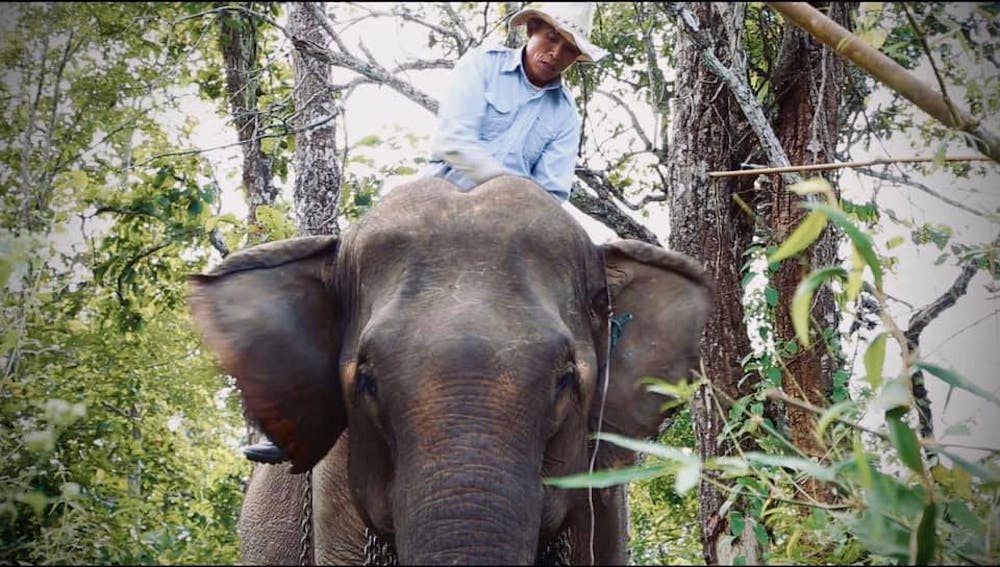Fish and plant sex will be the only PG-13 content at this year’s Cinema Verde International Environmental Film & Arts Festival.
The non-profit educational charity event, which focuses on environmental awareness and sustainability, will screen films from Friday to Monday in its 12th annual film festival. This year's festival includes 27 films from nine different countries.
The festival has previously taken place at The Hippodrome Theatre, the theater room at Paynes Prairie State Park and Heartwood Soundstage, among other locations. This year, the festival is digital. A one-day pass is $9.99, and a VIP pass giving access to all four days is $27.99. Tickets can be purchased on Cinema Verde’s website.
Cinema Verde aims to educate the community and create a sustainable future, festival director Trish Riley said. Their logo is the passionflower, an embodiment of their dedication to the cause.
Riley said she selected about 25% of the submissions to screen at the festival. On the last day, Riley will present awards to some of the films based on the elements, such as best energy film and best water film.
This year’s festival includes 27 films from nine different countries.
“Napoli Eden,” directed by Bruno Colella, is one of the films being shown and was an initial contender for the Best Documentary Feature at the 93rd Academy Awards. The Italian film features Neapolitan artist Annalaura di Luggo, who reconstructed recycled aluminum scraps into monuments.
Other films discuss plastic, land development and air quality.
“Elephant Keeper,” another film being shown at the festival, centers on elder Indigenous mahout Mr. Tong. His role as a mahout is to take care of an elephant, Mae Dok.
One of Tong’s eyes is blind, and the other is deteriorating. Still, he navigates the remote jungles of Sainyabuli Province, Laos, and locates food and shelter for the elephant. All of his income from the Elephant Conservation Center, where he works, goes to his family.
His story was not a faraway one, the director and producer Kate Kirby said.
“It felt like a very common experience to me,” she said, “that pressure to provide and to overcome a lot of the barriers … around being able to meet your basic needs.”
For two months, Kirby recorded Tong’s experiences and those of the endangered Asian elephant species. The film took seven years to produce, sometimes with five translators dissecting dialogue and verifying it, she said.
Even though elephants and caretakers have lived in kinship for centuries in Laos, there aren’t many films about the country or mahouts, Kirby said, because Indigenous voices can be ignored similarly to nature. She said she wants her work to help build a world where humans live in harmony with each other and the earth.
At past Cinema Verde festivals, the directors would lead discussions with the audience in person. This year, interviews with them are pre-recorded, Riley said. Still, the directors are invited to talk with the viewers in a sidebar chat of the virtual film screenings.
Riley said “old hippies” return to the festival every year. They grasp the environmental issues, but she hopes the new online format will expand the films’ audience even to children.
“I hope that since these films are going to be shown in people's living rooms, they get the whole family together to watch them,” Riley said.
Lynn Dirk, an Alachua County resident since 1969, has attended the festival since the first one, and this year, she bought a ticket for her sister in Alabama.
“I love movies,” she said. “And I love the environment. That equals, I love Cinema Verde.”
Dirk said she’s chuckled during some films, and she’s cried during others, such as those about factory farming.
“If you don't cry, you've lost your humanity,” Dirk said.
She aims to eradicate plastic from her life and recently replaced her plastic coffee maker with a glass one. Yet, in her backyard, she cuts bushes and the Spanish flag flowers once they grow tall.
“There is some instinct to try and master nature,” she said. “I think before there were so many people on the earth, it seemed like nature could never be affected by us. But now that's just not the case anymore.”
Humans’ destruction of trees is what inspires Riley to spread awareness about the dangers of it through the Cinema Verde film festival.
After college, the forest by Riley’s house was torn down. She said she ran in that forest as a kid. Built forts in it. She said she knew every path and would scamper among the plants, inhaling their fragrance.
“I just stood there, and I watched this destruction,” she said. “I knew that they had no idea the value of what they were destroying.”
And people, Riley said, don’t see what they allow to be demolished.
“The films are about how we're ruining this beautiful landscape,” she said. “If people will watch, they're going to become activated to help lead the way to build a better future, a sustainable future.”
More information on the films being shown at the Cinema Verde 2021 festival can be found through its website.
Contact Katie Delk at kdelk@alligator.org. Follow her on Twitter @katie_delk.

Katie Delk is a sophomore with a journalism major and an anthropology minor. For the Avenue, she writes about music, culture and the environment. When she is not writing, she is outside with the trees, reading a fantasy book or listening to Beach House.






